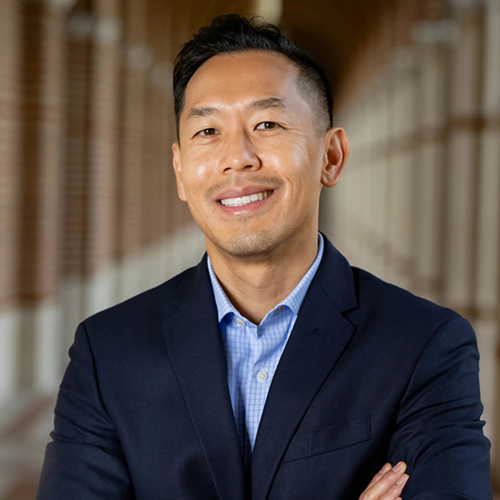
Dr. Tam Dao, Associate Vice President of Campus Safety and Research Security, brings a deep commitment to service, strategic foresight, and national expertise to his role at Rice. With a unique background spanning academia and the FBI, Tam blends behavioral science with operational rigor to safeguard the university’s people, research, and reputation. We had the opportunity to speak with Tam about his journey—from the classroom to counterintelligence—and how he’s applying his experience to build a forward-thinking, resilient, and collaborative safety culture across campus.
Can you share a little about your background and the pivotal experiences shaping your leadership style?
My career began in academia, where I was an assistant professor in the Counseling Psychology program at the University of Houston, focusing on personality assessment and behavioral analysis. That work led to an unexpected opportunity: joining the FBI, where I worked in counterintelligence and collaborated with the Behavioral Analysis Unit to assess personality and behavior.
These experiences have significantly shaped my leadership style. I attribute the majority of my career success to having great bosses, all of whom instilled in me a strong sense of humility and shaped my philosophy of servant leadership. As a team leader, if I’m not advancing my team’s careers or helping them reach new heights, I see that as a failure on my part.
In your current role, what are your primary responsibilities, and what does a typical day look like for you?
My role sits at the intersection of campus safety, research security, and export control. These three areas work together to help ensure the safety, compliance, and operational integrity of the university.
Under campus safety, I oversee the Rice University Police Department (RUPD), Emergency Management, and REMS (Rice Emergency Medical Services). Our job is to keep the campus safe in every sense—from responding to criminal behavior to preparing for emergencies, such as natural disasters or active shooter scenarios. That requires extensive training, planning, and relationship-building with local, state, and federal partners.
Research security and export control are more specialized, particularly in today’s climate. With increased federal scrutiny around foreign influence and technology protection, we help ensure that federally funded research at Rice remains secure and compliant. This involves assessing potential risks, safeguarding sensitive technologies, and assisting faculty in navigating complex export control regulations, especially when collaborating internationally.
Every day is different. Sometimes it’s about operational planning and policy, and sometimes it’s about responding to immediate concerns or providing guidance to researchers. What anchors everything we do is a commitment to protecting the university’s people, reputation, and research mission.
What are you working on now that you're excited about?
I’m particularly excited about leveraging technology and artificial intelligence to enhance both campus safety and research oversight.
We’re exploring how we might integrate AI into our camera safety efforts and help our officers be more effective. We’re also exploring innovative staffing models, like launching a reserve police officer program. This would allow qualified individuals from other fields to become certified and serve part-time, especially during large campus events. It’s a smart way to support public safety while being mindful of the university’s financial resources.
On the research side, we’ve rolled out a new AI-based tool that helps assess risk. It’s still in the early stages, but it has great potential to streamline our processes while ensuring we remain compliant with federal expectations.
What’s your vision for the future? What does that look like for your team and for Rice?
One of my primary goals is to elevate Rice’s profile as a national and international leader in research security and campus safety. We’re already doing strong work in these areas, and I’d like to expand our influence and visibility even further.
For RUPD, this means offering advanced training, building stronger ties with federal partners such as the FBI, and serving as a model for how university police departments can operate at the highest standards.
In research security, we want to shape how the field defines and measures institutional risk. Too often, judgments are made without transparency or clear criteria. Our goal is to ground those conversations in data and evidence.
We want to be seen not just as participants in the policing and research security space—but as thought leaders.
Reflecting on your career, what have been some of your toughest challenges, and what accomplishments are you most proud of?
In terms of accomplishments, I don’t point to any one work project as defining. Honestly, I’m most proud of my family. I’ve been married for almost 18 years, have three children, and have managed to maintain strong relationships through a career that exposes the horrors of life.
That answer might not sound glamorous, but in law enforcement, where stress levels are high and divorce rates are even higher, that’s no small feat. I’ve also kept lifelong friendships, which I consider just as meaningful as anything I’ve done professionally.
How do you recharge your battery and have fun?
I run, I bike, and I work out regularly—it’s how I clear my head. I spend a lot of time with my kids, my wife, and a close-knit group of friends. That sense of community, along with family and fitness, is how I stay grounded and recharged.

